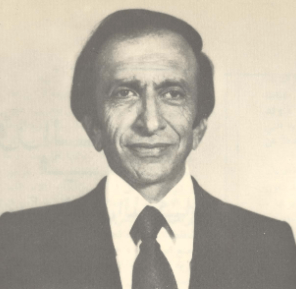Abdul Rauf al-Kasm facts for kids
Quick facts for kids
Abdul Rauf al-Kasm
|
|
|---|---|
|
عبد الرؤوف الكسم
|
|

Kasm in 1981
|
|
| Prime Minister of Syria | |
| In office 9 January 1980 – 1 November 1987 |
|
| President | Hafez al-Assad |
| Preceded by | Muhammad Ali al-Halabi |
| Succeeded by | Mahmoud Zuabi |
| Governor of Damascus | |
| In office 1979–1980 |
|
| President | Hafez al-Assad |
| Preceded by | Farouk al-Hamwi |
| Succeeded by | Mohamed Sioufi |
| Personal details | |
| Born | 1932 Damascus, Syria |
| Died | 19 October 2025 (aged 92–93) Munich, Bavaria, Germany |
| Political party | Ba'ath Party |
| Other political affiliations |
National Progressive Front |
Abdul Rauf al-Kasm (Arabic: عبد الرؤوف الكسم, romanized: ʿAbd ar-Raʾūf al-Kasm) was an important Syrian architect, university professor, and politician. He is best known for serving as the Prime Minister of Syria during the 1980s. Born in Damascus in 1932, he played a key role in his country's government. He passed away on October 19, 2025.
Contents
Abdul Rauf al-Kasm: A Syrian Leader
Abdul Rauf al-Kasm was a notable figure in Syrian politics and academia. He was born in Damascus, Syria, in 1932. His family was part of the Sunni branch of Islam. His father, Muhammad Atallah al-Kasm, was a respected scholar and a mufti in Damascus. A mufti is a religious legal expert who gives advice on Islamic law.
Early Life and Education
Abdul Rauf al-Kasm grew up in Damascus. He became a highly educated individual, studying architecture. Later, he became a professor at Damascus University. This shows his dedication to learning and his country.
Political Career and Prime Minister Role
Kasm was a member of the Ba'ath Party, a major political party in Syria. He held a very important position as the Prime Minister of Syria. He served in this role from January 9, 1980, until November 1, 1987. During this time, Hafez al-Assad was the President of Syria.
Working to Improve Government
As Prime Minister, Abdul Rauf al-Kasm had strong support from President Assad. He focused on improving how the government worked. He tried to address issues like corruption, which means preventing people from misusing their power or public money.
Leaving Office and Later Role
However, Kasm faced disagreements with the defense minister at the time, Mustafa Tlass. These disagreements eventually led to his departure from the prime minister's office in 1987. After leaving this top role, he continued to serve his country. He became a senior consultant, offering important advice on national security matters.
Abdul Rauf al-Kasm's Passing
Abdul Rauf al-Kasm passed away on October 19, 2025. He was 92 or 93 years old at the time of his death.
 | Leon Lynch |
 | Milton P. Webster |
 | Ferdinand Smith |

